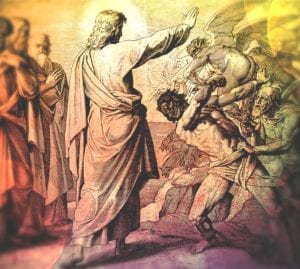
A New Authority
Mark’s Gospel introduces us to the beginning of Jesus’ public ministry by emphasizing Jesus’ authority in both the human and supernatural realms. The human realm is represented by the scribes who were the teachers of the Law, while the supernatural realm is represented by the evil spirits that tormented the people whom they possessed.
The people who heard Jesus teach at the synagogue were astonished at His teaching because unlike the scribes, He taught as one having authority. The scribes taught what they had learned from a master; their authority came from their teachers and the sources that they used, like the Torah. But as the Word of God Himself, Jesus surpasses the authority of the scribes. Even more impressive is Jesus’ authority in the supernatural realm, which He demonstrated by driving out an unclean spirit from a possessed man.
Early writings from the Jewish historian Flavius Josephus and the Qumran attest that exorcists drove out demons by invoking the names of Samuel, David or Solomon; but Jesus drove out demons on His own authority. No wonder the people were amazed; they said to one another: “What is this? A new teaching with authority! (Mk 1:27)” Everyone in the synagogue had never before seen anyone who taught with his own authority, and drove demons on his own authority!
The exorcism of the man in the synagogue marks the beginning of the battle between good and evil that can be seen throughout Mark’s Gospel. There will be those who will acknowledge Jesus’ authority, but there will also be those who will challenge Jesus’ authority and accuse Him to be in cahoots with Satan (Mk3:22). However, it is they who commit blasphemy against the Holy Spirit by denying Christ and it is they who will have joined forces with Satan.
An even deeper significance of the actions of Jesus as He began His ministry is that both His teaching in the synagogue and His exorcism of unclean spirits signify that Jesus has ushered in the Kingdom of God. Jesus came to fulfill the Law and the prophets and to break the stronghold of evil in people’s lives. The unclean spirit attested to this when it cried out to Jesus: “What have you to do with us, Jesus of Nazareth? Have you come to destroy us?” But it is what the unclean spirit said next that gives us the reason why everyone must listen to and follow Jesus: “I know who you are, the Holy One of God! (Mk 1:24)” The unclean spirit should know who Jesus is; after all, unclean spirits were once upon a time angels in heaven, but rebelled against God and became evil spirits and were thrown down to earth (Rev 12:9).
The power of Satan and the evil spirits are not infinite. They are but creatures. Although they can act in the world out of hatred for God and His Kingdom in Jesus Christ, and although their actions may cause grave injuries, both spiritual and physical, it is only permitted by divine providence, which with strength and gentleness, guides human and cosmic history. It is a great mystery that God permits diabolical activity, but we know “that in everything, God works for good with those who love Him (Rom 8:28)”.

In a January 14, 2021 memo to pastors in the Archdiocese of Atlanta, Archbishop Gregory J. Hartmayer, outlined liturgical adjustments to the traditional Blessing of Throats and to the distribution of ashes on Ash Wednesday. The archbishop also delegated that pastors can celebrate the Rite of Election at parishes for catechumens unable to attend the archdiocesan rites due to COVID-19 concerns.
- On the Feast of St. Blaise, Feb. 3, a general blessing will be permitted instead of individually blessing throats.
- For Ash Wednesday, Feb. 17, Archbishop Hartmayer asks priests to sprinkle ashes on the heads of penitents instead of tracing a cross on each person’s forehead.
- The Rite of Election will be held at four parish locations this year on Feb. 20. For catechumens who are unable to attend the Rite of Election at these locations, Archbishop Hartmayer permits pastors to perform the Rite of Election in their own parishes.